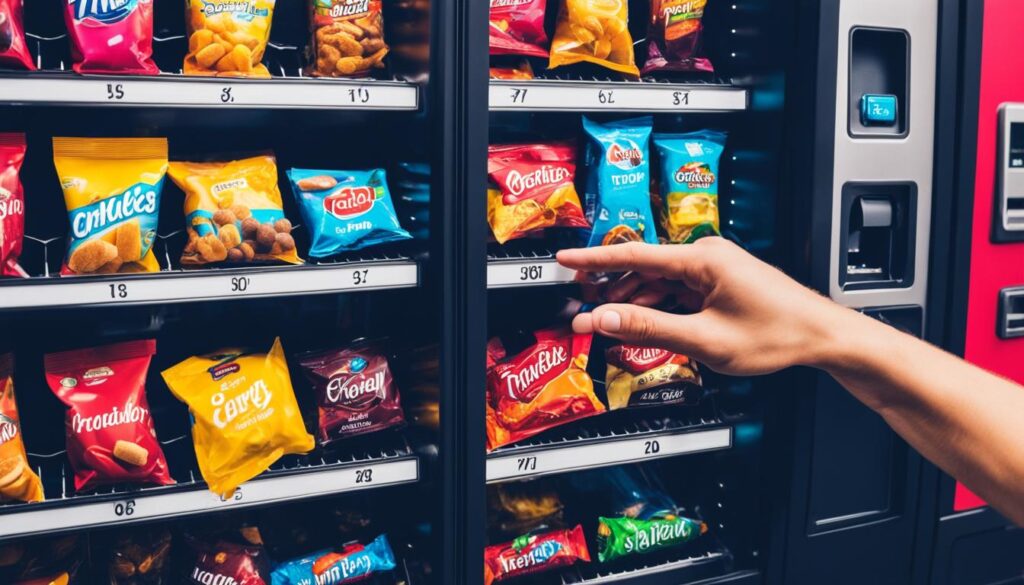When it comes to preventing obesity and managing weight, self-control plays a critical role. As we navigate through a food-centric world and face numerous temptations, having effective self-control techniques is key to making healthy choices and maintaining a balanced lifestyle.
Strategies for self-control in preventing obesity involve both situational approaches and behavioral interventions. By understanding and implementing these methods, individuals can develop the discipline and skills necessary to overcome impulses and make sustainable changes in their eating and physical activity habits.
In this article, I will delve into different self-control methods for obesity prevention, exploring the science behind them and providing practical tips for incorporating them into daily life. Whether you’re looking to shed a few pounds or simply maintain a healthy weight, these techniques can empower you to take control of your health and wellness.
Key Takeaways:
- Self-control is crucial for obesity prevention and weight management.
- Situational self-control strategies help avoid tempting situations and minimize the need for in-the-moment self-control.
- Behavioral weight loss programs employ various self-control techniques, including goal setting, self-monitoring, and social support.
- Obesity is associated with an increased risk of cardiovascular diseases, highlighting the importance of self-control in managing weight.
- Individualized approaches to self-control are essential for addressing the diverse needs and challenges of individuals.
The Struggle of Self-Control
Classical perspectives on self-control depict the internal struggle between opposing impulses. Philosophers like Plato and Aristotle compared self-control to a charioteer driving two horses, representing competing desires. This internal battle is also evident in psychological literature, with Freud proposing the ego as the mediator between the id and the super-ego. These perspectives highlight the difficulty of self-control and the need for effortful resistance to temptation.
The Process Model of Self-Control

In the process model of self-control, the focus is on implementing strategies that target situational factors rather than solely relying on internal mental processes. This approach recognizes that our environment plays a significant role in influencing our behavior and urges us to manipulate our surroundings to minimize the need for in-the-moment self-control.
By consciously avoiding tempting situations and making changes to our environment, we can proactively prevent undesirable actions related to obesity. This approach can be especially effective in managing weight and preventing unhealthy behaviors.
“The process model of self-control suggests that successful self-regulation involves manipulating our environment to support desired behaviors and suppress undesired actions.”
Strategies for Effective Self-Control in Obesity Prevention
To effectively manage weight and prevent obesity, implementing self-regulation methods can make a significant difference. Here are some practical strategies:
- Avoiding environments that promote overeating or unhealthy food choices
- Surrounding yourself with supportive individuals who encourage healthy habits
- Practicing mindful eating by paying attention to hunger and fullness cues
- Creating a structured routine for meals and snacks
- Setting realistic goals and tracking progress regularly
By adopting these self-control strategies and actively shaping our environment, we can optimize our chances of managing weight effectively and preventing obesity.
The Role of Behavioral Weight Loss Programs
Behavioral weight loss (BWL) programs play a significant role in helping individuals develop self-control to manage their weight effectively and prevent obesity. These programs focus on modifying energy-balance behaviors, such as dietary intake and physical activity levels, to achieve long-term weight loss and overall health improvement.
When it comes to weight management, self-control strategies are crucial. BWL programs utilize a range of evidence-based techniques to foster self-discipline and empower individuals to make healthier choices. Let’s delve deeper into some of these self-control strategies:
Goal Setting
Setting realistic and achievable goals is a fundamental aspect of self-control in weight management. Through goal setting, individuals can define their desired outcomes and create a roadmap for their weight loss journey. Whether it’s aiming for a specific weight or adopting healthier eating habits, setting clear goals provides focus and motivation.
Pre-planning
Pre-planning entails mapping out meals and physical activities in advance. By anticipating potential challenges and having a concrete plan, individuals are better equipped to resist impulsive and unhealthy choices. Planning meals and exercise routines allows for greater self-control and helps establish a routine that supports weight management efforts.
Self-monitoring
Self-monitoring involves keeping track of food intake, physical activity, and progress toward weight management goals. This self-awareness helps individuals develop accountability and identify patterns or triggers that may lead to overeating or a sedentary lifestyle. Tracking progress reinforces self-control by visualizing achievements and areas for improvement.
Behavioral Incentives
Behavioral incentives can provide additional motivation in the form of rewards or positive reinforcement. These incentives encourage adherence to healthy behaviors and help individuals stay committed to their weight management goals. The use of incentives taps into the psychology of self-control by providing immediate gratification.
Stimulus Control
Stimulus control involves modifying the environment to minimize exposure to tempting food or situations that may undermine self-control. By consciously creating an environment that supports healthy choices, individuals can reduce the need for constant willpower and make weight management easier. This strategy is particularly beneficial in preventing impulsive eating.
Social Support
Having a support system in place is essential for maintaining self-control and motivation throughout the weight loss journey. Social support can come from family, friends, or support groups who can provide encouragement, accountability, and understanding. Interacting with others who share similar goals and challenges can enhance self-control, provide guidance, and foster a sense of belonging.
Combining these self-control strategies within BWL programs can lead to successful weight loss, improved cardiovascular health, and overall well-being. By equipping individuals with effective tools for self-control, these programs empower people to take charge of their health and prevent obesity in the long term.
Obesity and Associated Health Risks

Obesity is a prevalent and concerning health condition that affects a significant portion of the population. It not only impacts an individual’s physical appearance and self-esteem but also poses a significant risk to their overall health. The excessive accumulation of body fat associated with obesity increases the likelihood of developing various cardiovascular diseases, including type 2 diabetes and high blood pressure.
People with obesity face an increased risk of cardiovascular disease due to several factors. Firstly, the excess weight places added strain on the heart, leading to an increased workload and higher blood pressure. Additionally, obesity is linked to unfavorable changes in blood cholesterol levels, such as decreased levels of HDL (good) cholesterol and increased levels of LDL (bad) cholesterol and triglycerides.
“Obesity is a major risk factor for the development of cardiovascular disease, and it requires effective behavioral treatments to address the associated health risks.”
Addressing obesity requires a comprehensive approach, including behavioral treatments and prevention strategies. Behavioral treatment focuses on modifying lifestyle behaviors, including dietary habits, physical activity levels, and self-control techniques, to achieve sustainable weight loss and improve overall health outcomes.
Implementing self-control strategies plays a crucial role in managing obesity and reducing the risk of cardiovascular disease. By practicing self-control techniques, individuals can make healthier choices, resist temptations, and maintain a balanced lifestyle. These strategies may include portion control, mindful eating, setting personal goals, and seeking social support.
The Link between Obesity and Cardiovascular Disease
Obesity significantly increases the likelihood of developing cardiovascular diseases. Research has shown that obesity is associated with a higher incidence of conditions such as:
- Type 2 diabetes
- High blood pressure
- Coronary artery disease
- Heart failure
- Stroke
These chronic conditions can have serious implications for an individual’s health and well-being. Preventing and managing obesity through effective self-control strategies is crucial for reducing the risk of cardiovascular disease and improving overall health outcomes.
| Cardiovascular Disease Risk Factors | Obesity |
|---|---|
| Type 2 diabetes | Obesity is a major risk factor for developing type 2 diabetes. Excess adipose tissue contributes to insulin resistance, leading to abnormally high blood glucose levels. |
| High blood pressure | Obesity is strongly associated with elevated blood pressure levels, which strain the heart and increase the risk of heart disease and stroke. |
| Coronary artery disease | The accumulation of plaque in the coronary arteries is more common in individuals with obesity, increasing the risk of heart attacks and other heart-related issues. |
| Stroke | Obesity increases the likelihood of developing blockages in blood vessels, leading to an increased risk of stroke. |
Understanding the link between obesity and cardiovascular disease risk highlights the urgent need to prioritize obesity prevention and management. By adopting effective behavioral treatments and practicing self-control techniques, individuals can reduce the risk of cardiovascular diseases and improve their overall health and well-being.
Behavioral Strategies for Obesity Prevention

When it comes to preventing obesity, implementing effective self-control strategies is essential. By modifying dietary and physical activity behaviors, individuals can take proactive steps towards weight management and overall health improvement. Here are some valuable behavioral strategies that can help in the prevention of obesity:
- Goal Setting: Establishing clear and realistic goals is a fundamental step in promoting self-control. By setting specific targets related to diet and exercise, individuals can stay focused and motivated on their weight management journey.
- Pre-Planning Meals and Exercise: Planning ahead by scheduling meals and workout sessions ensures preparedness and reduces impulsive decisions. This strategy helps individuals maintain control over their eating habits and physical activity levels.
- Self-Monitoring: Regularly tracking food intake, exercise sessions, and weight progress enables individuals to gain awareness of their behaviors. Monitoring progress serves as a valuable tool for self-reflection and self-control maintenance.
- Behavioral Incentives: Rewarding oneself for achieving weight-related milestones can reinforce positive behaviors and enhance motivation. It can be as simple as treating yourself to a non-food-related reward or engaging in an enjoyable activity.
- Implementing Stimulus Control: Managing environmental cues that trigger unhealthy eating or sedentary behaviors is crucial. Keeping tempting foods out of sight and creating an environment conducive to physical activity can help individuals maintain self-control.
- Seeking Social Support: Surrounding oneself with a supportive network of friends, family, or even joining community groups focused on healthy living can provide encouragement and accountability. Sharing experiences and challenges with others helps reinforce self-control efforts.
By integrating these behavioral strategies into one’s lifestyle, individuals can develop and maintain self-control in their weight management journey. These techniques empower individuals to make informed choices, resist temptations, and ultimately prevent obesity.
Increasing Self-Efficacy in Obese Adults

In order to promote behavior change in obese adults, it is essential to focus on increasing self-efficacy. Self-efficacy refers to an individual’s belief in their own ability to engage in physical activity and make positive changes in their lifestyle. By building self-efficacy, obese adults can develop the necessary self-control strategies for preventing obesity and achieve successful weight loss outcomes.
Previous research has identified several effective behavior change techniques (BCTs) that can help in developing self-control and increasing self-efficacy. These techniques empower individuals to overcome obstacles and foster positive behaviors related to weight management. Some of the effective BCTs for developing self-control in weight loss include:
- Action planning: This involves setting specific goals and developing a detailed plan of action to achieve them. By outlining clear steps, obese adults can enhance their self-efficacy and improve their ability to exercise self-control in weight management.
- Time management: Effective time management strategies can help individuals prioritize physical activity and create a routine that supports their weight loss goals. By allocating dedicated time for exercise, obese adults can strengthen their self-efficacy and reinforce their self-control efforts.
- Social support: Having a strong support network of friends, family, or support groups can significantly enhance self-efficacy in obese adults. By providing encouragement, accountability, and understanding, social support helps individuals develop and maintain self-control strategies for preventing obesity.
By incorporating these techniques into their weight loss journey, obese adults can boost their self-efficacy and increase their chances of long-term success. Building self-control and self-efficacy go hand in hand, and with the right strategies and support, individuals can overcome obstacles, make healthier choices, and achieve their weight management goals.
Comparison of Effective Behavior Change Techniques (BCTs)
| Behavior Change Technique (BCT) | Description | Effectiveness in Increasing Self-Efficacy |
|---|---|---|
| Action planning | Setting specific goals and developing a detailed plan of action | High |
| Time management | Effective prioritization and allocation of time for physical activity | Moderate |
| Social support | Encouragement, accountability, and understanding from a support network | High |
The Relationship Between Self-Efficacy and Physical Activity

The relationship between self-efficacy and physical activity behavior in individuals struggling with obesity is a complex one. While self-efficacy is generally considered an important factor in determining an individual’s engagement in physical activity, research suggests that other mechanisms may play a more influential role in promoting physical activity in this population. It is important to explore additional behavior change techniques that can effectively increase physical activity behavior in individuals with obesity.
Effective Techniques for Developing Self-Control
- Teaching the use of prompts or cues: Providing individuals with obesity specific cues or prompts can help them initiate and sustain physical activity behavior. These prompts act as reminders and can help individuals overcome barriers to engagement.
- Self-monitoring: Encouraging individuals to track and record their physical activity levels can enhance their awareness of their behavior. This self-awareness can empower individuals to make necessary adjustments and maintain consistent physical activity.
- Goal setting: Setting clear and achievable goals can significantly increase motivation and adherence to physical activity. By breaking down goals into smaller, manageable steps, individuals with obesity can build confidence and maintain their self-control.
- Stimulus control: Modifying the environment to reduce triggers or cues that lead to sedentary behavior can support the development of self-control in physical activity. Creating a space that is conducive to physical activity can help individuals overcome barriers and engage in regular exercise.
Incorporating these techniques can contribute to the development of self-control for weight management in individuals struggling with obesity. These strategies emphasize the importance of empowering individuals to take ownership of their physical activity habits and promote positive behavior change.
Are Self-Control Methods Effective for Lasting Weight Loss and Obesity Prevention?
Self-control methods are crucial for achieving lasting weight loss transformation and preventing obesity. By practicing portion control, mindful eating, and regular physical activity, individuals can effectively manage their weight over time. These methods promote healthy habits and sustainable behavior changes for long-term success.
The Importance of Individualized Approaches

Given the complexity of obesity and the diverse needs of individuals, it is essential to adopt individualized approaches to self-control in obesity prevention.
Different strategies may work for different individuals, and a personalized approach can help tailor interventions to meet specific needs. This individualized approach allows for greater effectiveness in managing weight and preventing obesity.
Finding the Right Self-Regulation Methods
When it comes to weight management, self-regulation plays a key role. It involves the ability to control one’s impulses, make informed choices, and maintain healthy behaviors.
Each person has unique circumstances, preferences, and challenges that influence their relationship with food and physical activity. Therefore, it is important to find self-regulation methods that work best for each individual.
One approach is mindful eating, which involves paying attention to internal hunger and fullness cues, savoring the taste and texture of food, and eating with awareness. This practice can help individuals develop a healthier relationship with food and make better choices.
Another strategy is self-monitoring, which involves keeping track of food intake, physical activity, and progress towards weight management goals. This can be done using a journal, smartphone app, or wearable device. Self-monitoring helps individuals stay accountable and identify patterns or triggers that may sabotage their efforts.
Strategies for Self-Control in Preventing Obesity
In addition to self-regulation methods, there are various strategies that can enhance self-control and prevent obesity:
- Goal Setting: Setting specific, achievable goals can provide a sense of direction and motivation. It is important to set realistic goals that align with individual capabilities and priorities.
- Environmental Modifications: Changing the physical environment can help reduce exposure to unhealthy food cues and create an environment that supports healthy choices. For example, keeping nutritious snacks readily available and removing high-calorie temptations from the kitchen.
- Stress Management: Stress is often linked to emotional eating and unhealthy food choices. Finding effective stress management techniques, such as exercise, meditation, or hobbies, can help prevent emotional eating and support weight management.
- Support Systems: Building a support network of family, friends, or group programs can provide encouragement, accountability, and guidance. Surrounding oneself with people who have similar goals can help maintain motivation and provide valuable insights and advice.
By implementing these self-control strategies and individualized approaches, individuals can take charge of their weight management journey and work towards preventing obesity. Remember, everyone’s path is unique, so finding what works best for you is essential.
| Individualized Approaches | Benefits |
|---|---|
| Mindful Eating | Enhances awareness, improves portion control, and reduces overeating. |
| Self-Monitoring | Increases accountability, identifies problem areas, and tracks progress. |
| Goal Setting | Provides motivation, focus, and a clear path towards weight management goals. |
| Environmental Modifications | Reduces exposure to unhealthy food cues and creates a supportive environment. |
| Stress Management | Prevents emotional eating and helps maintain healthy behaviors during challenging times. |
| Support Systems | Offers encouragement, guidance, and accountability through a network of like-minded individuals. |
Conclusion
In conclusion, self-control plays a crucial role in obesity prevention. By implementing situational self-control strategies and utilizing behavior change techniques, individuals can effectively manage their weight, improve health outcomes, and reduce the risk of cardiovascular disease. The power of self-control empowers individuals to achieve their weight management goals and embrace a healthier lifestyle.




